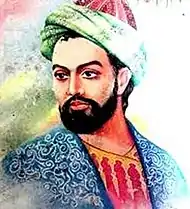Taleb Amoli
Muhammad Ibn Abdullah Taleb Amoli known as Talib Amuli and Talib Amoli (Persian: طالب آملی, also aka Ashub, Atash, Taleba and Malek Al Shoara Taleb) (b. Mazandaran 1586 - d. India 1627) Iranian Tabari poet was of the early 17th century. He was the poet laureate of the Mughal emperor Jahangir from 1629 till his death. His poetry is in the “Indian Style” of Persian language.[1][2] A poetry collection (divan) and the poem Talib and Zohre are the works that are left of him today. The fact that he read mathematics, geometry and philosophy in his poems reveals that he received a good education. He is also known to be a good calligrapher.
Muhammad Amoli | |
|---|---|
 | |
| Mystic Poet | |
| Born | 16th century - 1586 Amol, Iran |
| Died | 17th century - 1627 Kashmir or Lahore |
| Venerated in | Safavid dynasty Mughal Empire |
| Influenced | Nima Yooshij Indian style |
Tradition or genre | Mystic Poetry Mathematician Calligraphy |
| Major works | Poetry Court (Ghazal) |
Taleb played a crucial role in the rapid transformation of poetic style at the beginning of the 17th century. His work gave a free rein to the tendency toward conceptualism (Fantasy) in the “fresh style” (later known as the Indian Style) that had begun to emerge a generation earlier in the poetry of Naẓiri and ʿOrfi. At the same time, he gave a new vitality to conventional images and common idioms by exploring their full figurative implications, a procedure Taleb himself revealingly dubs his ṭarz-e esteʿāre (metaphorical style). Taleb entered Jahangir’s service about 1616 and was appointed to the post of poet laureate (Malek osh-Sho'ara) in 1619. His Ghazal poems are very similar to Hafez.[3][4][5]
Taleb after poets Ferdowsi and Omar Khayyam, is the third poet in terms of the number of verses among Iranian poets. Taleb, the number of couplets in the published complex is approaching 23,000. [6] Taleb was buried in the compound of the Taj Mahal at Shah Jahan command when she died. Taleb gravesite is unknown.[7]
Poem
ما به استقبال غم کشور به کشور میرویم چون ز پا محروم میمانیم با سر میرویم
صد ره این ره رفتهایم و بار دیگر میرویم العطشگویان به استقبال ساغر میرویم
چون به پا رفتن میسر نیست ما را سوی دوست نامه میگردیم و با بالِ کبوتر میرویم
کنون کز مو به مویم اضطراب تازه میریزد نسیمی گر وزد اوراقم از شیرازه میریزد
لب عیشم به هر عمری نوایی میزند اما زبان شیونم هردم هزار آوازه میریزد
دلی دارم که در آغوش مرهم زخم ناسورش نمک میگوید و خمیازه بر خمیازه میریزد
عجب گر نقشبندیهای صبر ما درست آید که عشق این طرح بیپرگار، بیاندازه میریزد
Notes
- The Elements of Semantic Ambiguity in the Poetry of Talib Amoli
- Faculty of Literature and Human Sciences - literature.ut.ac
- Network Comprehensive Book Gisoom
References
- Taleb Amoli - Encyclopædia Iranica
- Brillonline - Taib Amuli
- International Talib Amoli Conference
- Talib i Amuli the poet laureate of Jahangir, his life and times - Amazoon
- The University of Texas at Austin / Ghalib's Persian Ghazal poetry and its critics
- Taleb Amoli in the ranks of top literature
- Daniela Menghini Correale, Taleb: Concordance and Lexical Repertoiries of 1000 Lines, Venice, 1990.